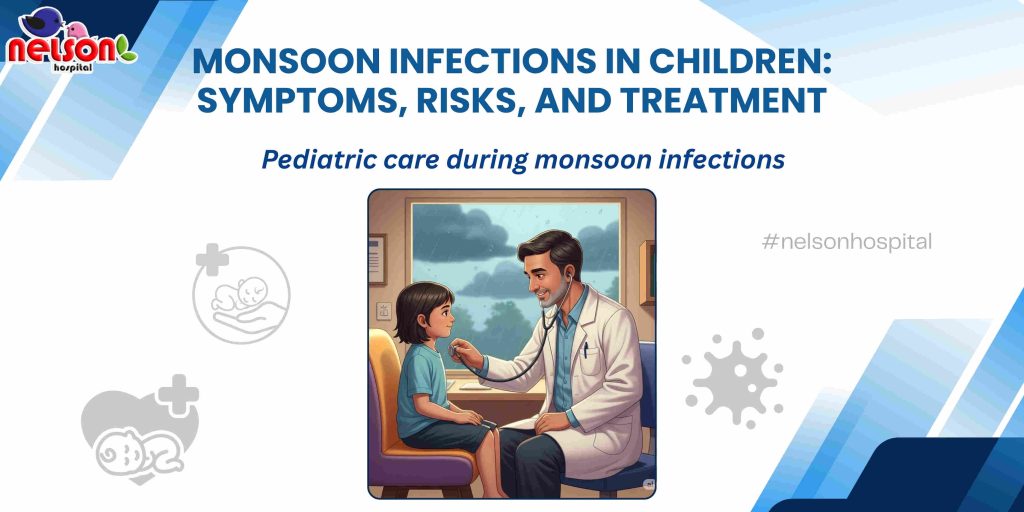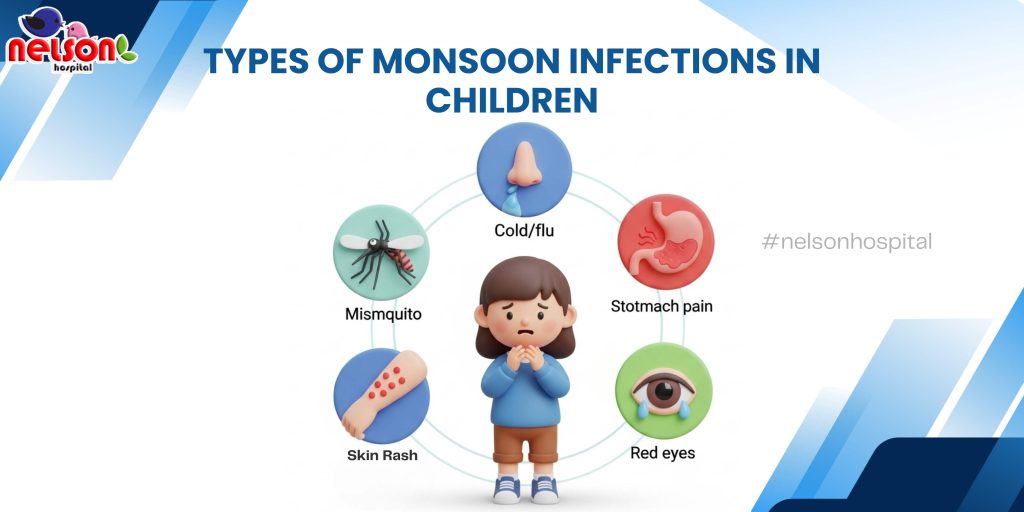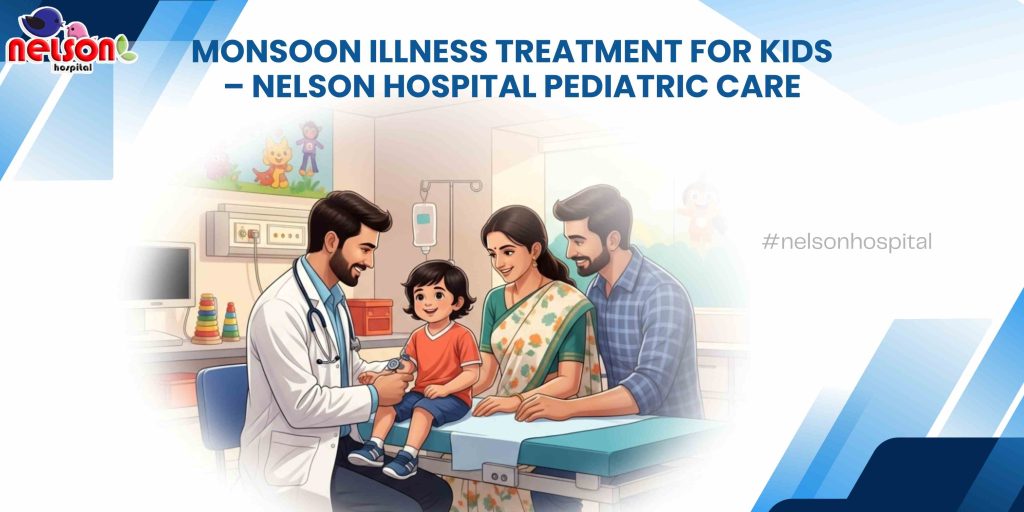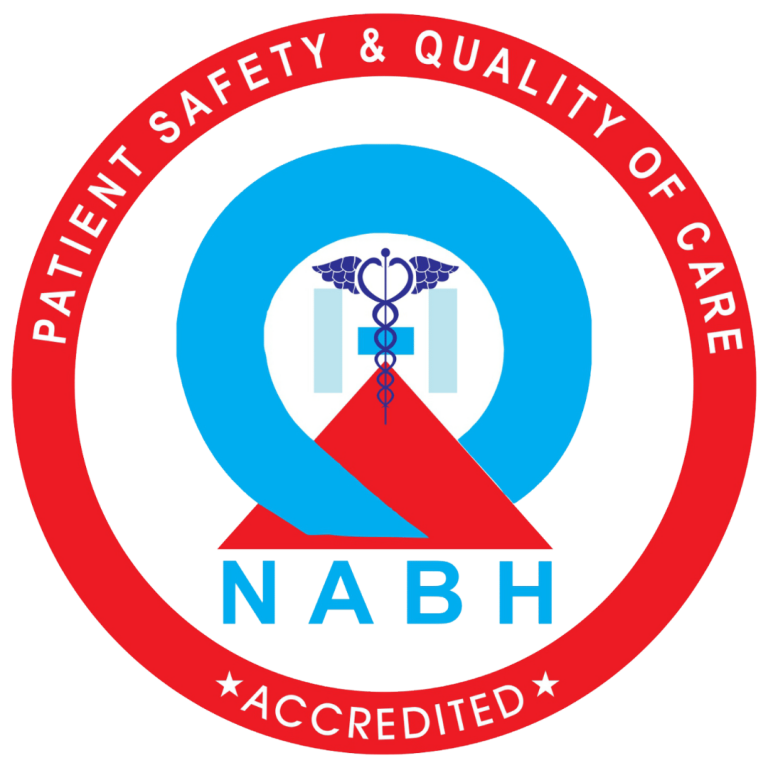
Monsoon Infections in Children: Symptoms, Risks, and Treatment
Monsoon brings much-needed relief from the scorching heat, but it also creates a breeding ground for various infections, especially in children. The increased humidity, water stagnation, and temperature changes during the rainy season make kids more vulnerable to bacterial, viral, and fungal infections. As a parent, it’s essential to understand the most common monsoon infections in children, their symptoms, potential risks, and when to seek treatment. At Nelson Hospital, our pediatric experts provide timely diagnosis and effective care to ensure your child stays healthy throughout the season.
Common Monsoon Infections in Children

1. Respiratory Infections
The drop in temperature and damp environment can lead to respiratory infections like the common cold, cough, bronchitis, and flu. Children, with their developing immune systems, are more susceptible.
Symptoms:
- Runny nose
- Sore throat
- Sneezing and coughing
- Fever
Risks:
If untreated, these can develop into pneumonia or severe respiratory issues.
2. Gastrointestinal Infections
Contaminated food and water during the monsoon can cause stomach infections in children such as gastroenteritis, food poisoning, and typhoid.
Symptoms:
- Diarrhea or loose motions
- Vomiting
- Abdominal cramps
- Dehydration
Risks:
Severe dehydration,Nutritional deficiencies,Weakened immunity
3. Skin and Fungal Infections
The humid environment makes skin prone to fungal growth and infections. Kids playing in stagnant water or staying in wet clothes are most at risk.
Symptoms:
- Itchy skin rashes
- Red or scaly patches
- Fungal infections in skin folds or between toes
- Boils or blisters
Risks:
Spreading of infection,Skin irritation and discomfort
4. Vector-Borne Diseases
Stagnant rainwater serves as a breeding ground for mosquitoes, increasing the risk of diseases like dengue, malaria, and chikungunya in children.
Symptoms:
- High fever
- Headache
- Joint and muscle pain
- Nausea
Risks:
Severe dehydration,Internal bleeding (in dengue),Hospitalization required in critical cases
5. Eye Infections
Increased humidity can lead to eye infections like conjunctivitis, which is highly contagious among school-going children.
Symptoms:
- Red, itchy eyes
- Watery discharge
- Swelling
- Light sensitivity
Risks:
Discomfort,Spreading infection within family or school
Why Children Are More Vulnerable in Monsoon
Children are more vulnerable during the monsoon due to their underdeveloped immune systems and increased exposure to environmental factors. They often play in rainwater, get wet frequently, and may consume contaminated food or water, which increases the risk of infections. Sudden weather changes also make them prone to respiratory illnesses, while the humid conditions promote skin and fungal infections. Poor hand hygiene and close contact in schools can further spread infections quickly. As a result, children are more susceptible to viral fevers, stomach bugs, and mosquito-borne diseases like dengue and malaria. Timely care and hygiene practices are essential to protect them.
Children have developing immune systems and are naturally more active and exposed to outdoor environments. Playing in rainwater puddles, eating unhygienic food, and poor hand hygiene increase the risk of infections.
At Nelson Hospital, our pediatricians stress on the importance of seasonal awareness and early treatment to avoid complications.
Treatment and Care at Nelson Hospital

At Nelson Hospital, we specialize in pediatric care, offering:
Early Diagnosis
Our experienced doctors conduct thorough evaluations and recommend the right diagnostic tests.
In-Patient Care
In case of serious infections like dengue or pneumonia.
Customized Treatment Plans
Depending on the infection, we offer targeted antibiotic/antiviral/fungal treatment.
Hydration & Nutritional Support
Especially for gastrointestinal cases to avoid dehydration
When to Visit a Doctor
You should consult a pediatrician if your child experiences:
- High fever for more than two days
- Continuous vomiting or diarrhea
- Signs of dehydration (dry mouth, sunken eyes)
- Skin infections spreading or worsening
- Breathing difficulties or persistent cough
Tips to Prevent Monsoon Infections in Children
- Encourage regular handwashing with soap
- Avoid street food and ensure safe drinking water
- Keep children dry and clean; change wet clothes promptly
- Use mosquito repellents and keep surroundings clean
- Boost immunity with a healthy diet including fruits, vegetables, and plenty of fluids
- Ensure timely vaccinations
Conclusion
Monsoon infections in children are common but can be effectively managed with timely care and awareness. Parents should remain vigilant about symptoms and take prompt action. At Nelson Hospital, our team is committed to delivering trusted, child-friendly care throughout the rainy season.
If you suspect any monsoon-related illness in your child, don’t wait. Visit Nelson Hospital for expert pediatric care and a quick recovery.
Book an Appointment



